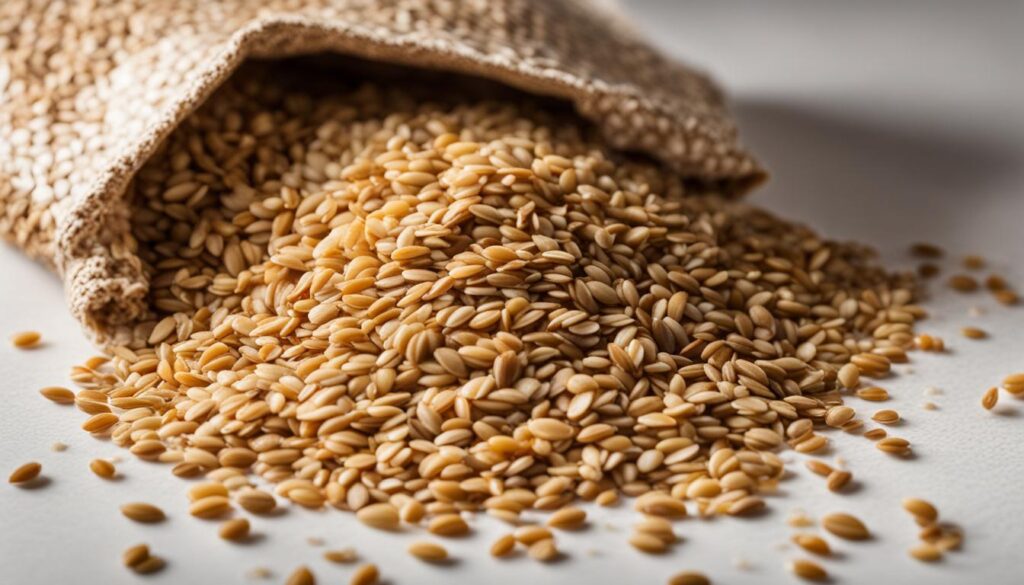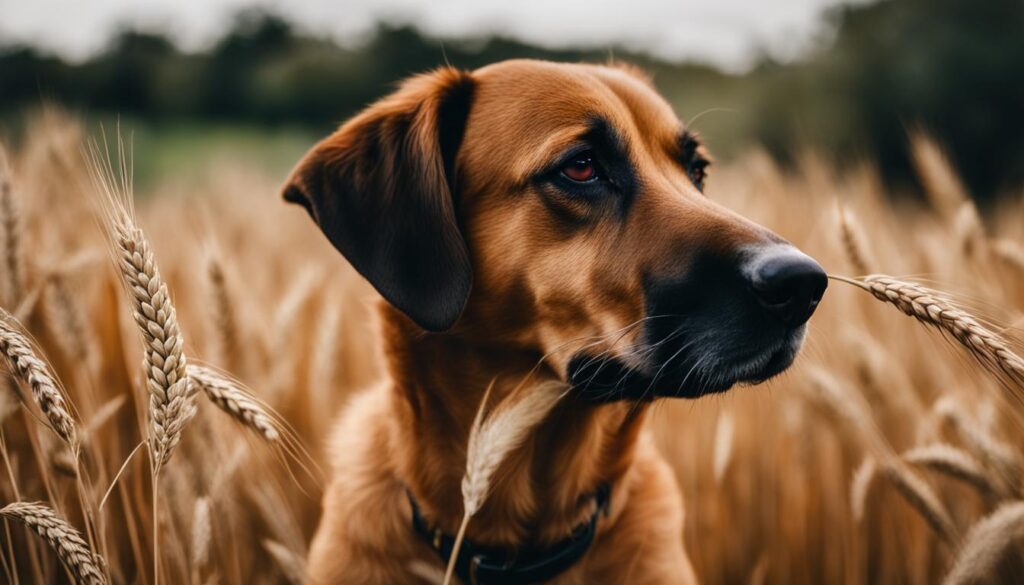Are grains good or bad for your furry friend? The topic of including grains in a dog’s diet has sparked an ongoing debate among pet parents and experts. With recent concerns about the health impacts of grain-free diets, it’s important to understand the benefits and potential risks of including grains in your dog’s nutrition.
Key Takeaways:
- The debate surrounding grains in dog diets is multifaceted and ongoing.
- Grain-free diets have been linked to potential health issues, such as canine dilated cardiomyopathy (DCM).
- Grains can provide essential nutrients and promote healthy digestion in dogs.
- Some dogs may have allergies or sensitivities to grains, requiring alternative dietary options.
- Consult with your veterinarian to determine the best diet for your individual dog’s needs.
The Rise of Grain-Inclusive Diets
The increase in popularity of grain-inclusive diets can be attributed to several factors. Retailers and manufacturers have noticed a spike in sales and demand for whole grain and legume-free dog food options. Ancient grains like oatmeal, barley, and quinoa are favored by pet parents as they are nutrient-dense and highly digestible. The trend towards grain-inclusive diets has been further fueled by the FDA’s investigation into potential links between certain grain-free, legume-inclusive diets and canine DCM. Some pet food marketers have responded to consumer concerns by introducing grain-inclusive formulas to their product lines.

Table: Comparison of Grain Content in Dog Diets
| Brand | Grain Content |
|---|---|
| Brand A | 50% |
| Brand B | 30% |
| Brand C | 10% |
As pet owners become more aware of the potential benefits of grains in their dog’s diet, they are seeking out brands that offer grain-inclusive options. Whole grain dog food brands like Brand A, Brand B, and Brand C have gained popularity for their commitment to using high-quality grains as primary ingredients. These brands provide a balanced and nutritious diet for dogs, incorporating the nutritional benefits of grains while also catering to specific dietary needs.
Grains in dog food offer several benefits, including a good source of dietary fiber for maintaining regular bowel movements and a healthy digestive tract. They also provide essential nutrients and energy for dogs. While some dogs may have grain allergies or sensitivities, the majority can tolerate grains without any adverse effects. It is important for pet owners to consult with their veterinarian to determine the best dietary choices for their dogs and consider the specific nutritional needs of their individual pets.
Grains and Canine Digestive Health
When it comes to promoting healthy digestion in dogs, grains have an important role to play. They provide a good source of dietary fiber, which helps maintain regular bowel movements and supports a healthy digestive tract. Additionally, grains offer a variety of essential nutrients that contribute to overall canine health. However, it’s important to note that some dogs may have grain allergies or sensitivities, which may require alternative options for their diet.
For pet parents seeking alternatives to grains in their dog’s food, there are grain-free options available on the market. These diets often utilize ingredients like legumes or potatoes as primary sources of carbohydrates. While grain-free diets may be suitable for dogs with grain allergies or sensitivities, it’s crucial to consult with a veterinarian to ensure the chosen alternative ingredients meet your dog’s nutritional needs.

Alternatives to Grains in Dog Food
It’s worth noting that while grains are common in many dog food brands and provide nutritional benefits, they aren’t the only option for a balanced diet. Other ingredients like sweet potatoes, peas, and lentils can serve as alternatives to grains in dog food formulations. These ingredients offer a good source of carbohydrates and can help meet the energy needs of dogs. However, just like with any dietary changes, it’s essential to introduce new ingredients gradually and monitor your dog’s response.
Key Takeaways:
- Grains play a role in promoting healthy digestion in dogs by providing dietary fiber.
- Some dogs may have grain allergies or sensitivities, necessitating the inclusion of alternative ingredients in their diet.
- Grain-free options, such as legumes or potatoes, can be suitable alternatives for dogs with grain allergies or sensitivities.
- Consulting with a veterinarian is crucial to ensure the chosen alternative ingredients meet your dog’s nutritional needs.
- Other ingredients like sweet potatoes, peas, and lentils can serve as alternatives to grains in dog food formulations.
| Grains | Benefits |
|---|---|
| Dietary fiber | Promotes healthy digestion and regular bowel movements |
| Nutrients | Provide essential nutrients for overall canine health |
The Impact of Grain-Free Diets on Canine Health
As the debate over grains in dog diets continues, it is important to consider the potential impact of grain-free diets on canine health. While it is true that some dogs may have allergies or sensitivities to grains, the majority of dogs can tolerate grains without any adverse effects. The decision to feed a grain-free diet should be based on an individual dog’s specific needs and should be discussed with a veterinarian.
Grain-free diets often rely on alternative sources of carbohydrates, such as legumes or potatoes. While these ingredients may provide some nutritional value, it is essential to ensure that a grain-free diet is balanced and meets the dog’s nutritional requirements. A balance of protein, fats, carbohydrates, vitamins, and minerals is crucial for a dog’s overall health and well-being.
Recent reports of canine dilated cardiomyopathy (DCM) have raised concerns about the potential risks associated with grain-free diets. It is important to note that the exact relationship between diet and DCM is still being investigated, and more research is needed to fully understand the connection. In the meantime, pet parents should consider their dog’s specific needs, consult with a veterinarian, and make informed decisions about their dog’s diet.
The Role of Grains in a Dog’s Diet
Grains have long been a staple in many dog food recipes, providing a source of carbohydrates, fiber, and essential nutrients. They can also help promote healthy digestion in dogs. However, it is important to note that not all grains are created equal. Some grains, like whole grains, offer more nutritional value than refined grains.
When choosing a dog food, pet parents should look for high-quality grains like brown rice, barley, and oats. These grains are nutrient-dense and highly digestible, providing valuable energy and nutrients for dogs. Additionally, whole grains often contain higher levels of fiber, which can help support a healthy digestive system.
| Benefits of Grains in Dog Food | Grain-Free Alternatives |
|---|---|
|
|
“Grains provide valuable energy, fiber, and essential nutrients for dogs, and can help promote a healthy digestive system.”

In conclusion, the decision to include or exclude grains from a dog’s diet should be based on individual needs and should be made in consultation with a veterinarian. While grain-free diets can be suitable for some dogs, it is important to ensure that they are nutritionally balanced and meet the dog’s specific nutritional requirements. Pet parents should also be aware of the potential risks associated with certain ingredients and stay informed about ongoing research in the field of canine nutrition.
Grains in Dog Food Brands
When it comes to finding the right dog food for your furry friend, there are many factors to consider. One important aspect is the inclusion of grains in the diet. While some pet parents may choose grain-free options, there are numerous whole grain dog food brands available that provide balanced and nutritious meals for dogs. These brands understand the significance of incorporating grains into their formulas to support overall canine health and well-being.
One example of a brand that offers a range of whole grain dog food recipes is Solid Gold Pet. Their formulas are tailored to meet different dietary needs and contain high-quality grains such as brown rice, pearled barley, and oatmeal. Solid Gold Pet recognizes the nutritional value of grains, which provide essential nutrients, dietary fiber, and energy for dogs.
Another brand that has introduced grain-inclusive recipes is Fromm Family Foods. Their product line includes a formula that combines hearty meats with high-quality grains like rice, oats, and barley. By including these grains, Fromm Family Foods ensures that dogs receive a well-rounded and nourishing diet.
The Benefits of Whole Grain Dog Food Brands
- High-quality grains provide essential nutrients for dogs
- Grains are a good source of dietary fiber, promoting healthy digestion
- Whole grain dog food brands offer a variety of options to meet different dietary needs
- Grain-inclusive formulas provide dogs with energy and sustained levels of nutrients
“Choosing a whole grain dog food brand can give you peace of mind, knowing that you are providing your dog with a balanced and nutritious diet. The inclusion of grains in these formulas supports your dog’s overall health and well-being.”
When selecting a dog food brand, it is important to consider your dog’s specific nutritional needs and consult with your veterinarian. They can provide valuable guidance and recommendations based on your dog’s age, breed, activity level, and any existing health conditions. By choosing a whole grain dog food brand, you can ensure that your furry friend receives the nourishment they need for a happy and healthy life.
Educating Pet Owners
When it comes to the ongoing debate about grains in dog diets, it’s essential for pet owners to have access to accurate information. With conflicting opinions and a multitude of choices, it can be challenging to navigate the world of pet nutrition. That’s where independent pet specialty retailers play a crucial role in educating pet owners and dispelling misconceptions.
These knowledgeable retailers understand the grain-inclusive and grain-free diet debate and can provide valuable guidance. By relying on reputable, science-based sources, they can help pet parents make informed decisions about their dog’s diet. Whether it’s discussing the nutritional value of different ingredients or addressing concerns about grain-free diets, these retailers are there to assist.
However, it’s important to note that veterinary input is invaluable in this process. Veterinarians have a deep understanding of canine nutrition and can provide personalized recommendations based on a dog’s specific needs. By consulting with a veterinarian, pet owners can ensure they are choosing a diet that supports their dog’s overall health and well-being.
Common Grain-Free Dog Food Misconceptions
“Grain-free is always better for my dog.”
- Grains can provide important nutrients for dogs when included in a balanced diet.
- Not all dogs have allergies or sensitivities to grains.
- The FDA’s investigation into grain-free diets and canine dilated cardiomyopathy (DCM) has raised concerns about the potential risks of certain ingredients.
“Grain-free diets are the only option for dogs with allergies.”
While some dogs may have grain allergies, there are alternative options available that can meet their dietary needs. Grain-free diets often rely on alternative sources of carbohydrates, such as legumes or potatoes. It’s important to work with a veterinarian to determine the best diet for dogs with specific allergies or sensitivities.
Table: Grain-Inclusive and Grain-Free Diets – Pros and Cons
| Grain-Inclusive Diets | Grain-Free Diets | |
|---|---|---|
| Nutritional Value | Provide essential nutrients and dietary fiber | May lack certain nutrients unless formulated with alternative ingredients |
| Allergies/Sensitivities | May cause issues for dogs with grain allergies or sensitivities | Alternative options available for dogs with grain allergies or sensitivities |
| Health Risks | No known health risks, unless specific allergies or sensitivities are present | Potential risk of developing dilated cardiomyopathy (DCM) in certain cases |
Marketing Trending Foods
The pet food industry has responded to the grain-inclusive and grain-free diet debate by adapting their marketing strategies to meet consumer demands. With the increasing awareness and concerns regarding the potential health impacts of grain-free diets, pet food companies are emphasizing transparency and providing accurate information about the nutritional value of their products.
The marketing trend for pet food now focuses on highlighting the benefits of including high-quality grains in dog diets. Brands are promoting their grain-inclusive options as a means to provide balanced and nutritious meals for dogs. They are incorporating ancient grains and superfoods into their recipes, showcasing the use of nutrient-dense ingredients that support canine health. This approach aims to reassure pet owners and address the misconceptions associated with grain-inclusive diets.
“Our grain-inclusive recipes are formulated with carefully selected grains like brown rice, barley, and oatmeal, which provide essential nutrients and fiber for optimal digestion and overall well-being,” says Sarah Thompson, marketing director of a leading pet food brand. “We want pet owners to make informed decisions based on accurate information, and that’s why we provide complete transparency about the ingredients used in our products.”
The Role of Transparency
Transparency has become a key factor in the marketing of pet food products. Pet owners are increasingly seeking brands that provide detailed information about the ingredients used, sourcing practices, and manufacturing processes. By offering transparency, pet food companies aim to build trust with consumers and demonstrate their commitment to producing high-quality, safe, and nutritious food for dogs.
Additionally, pet food companies are using various marketing channels to educate pet owners about the benefits of grain-inclusive diets. They are leveraging social media platforms, blogs, and newsletters to share educational content, nutritional tips, and success stories from pet owners who have switched to grain-inclusive options. This approach allows them to engage with their target audience and address their concerns directly.
In conclusion, the pet food industry has responded to the grain-inclusive and grain-free diet debate by incorporating marketing strategies that prioritize transparency and education. By providing accurate information, highlighting the benefits of grain-inclusive diets, and engaging with pet owners, brands aim to ensure that pet parents can make informed decisions about their dog’s diet. The ongoing focus on marketing trending foods reflects the industry’s commitment to meeting consumer demands and promoting the overall health and well-being of dogs.
| Key Marketing Strategies for Trending Pet Foods | Benefits |
|---|---|
| Emphasizing transparency | Builds trust with consumers and demonstrates commitment to quality |
| Incorporating high-quality grains and superfoods | Provides balanced nutrition and supports canine health |
| Using various marketing channels | Engages pet owners, shares educational content, and addresses concerns |
Table: Key Marketing Strategies for Trending Pet Foods
Conclusion
The discussion surrounding grains in dog diets is multifaceted and ongoing. While some dogs may benefit from grain-inclusive diets, others may have allergies or sensitivities that require alternative options. The FDA’s investigation into grain-free diets and canine DCM has raised important questions about the potential risks associated with certain ingredients.
Pet owners should consult with their veterinarian to determine the most suitable diet for their individual dogs, taking into consideration their specific nutritional needs and any existing health conditions. It is essential to prioritize the health and well-being of our canine companions when making dietary choices.
By staying informed and seeking professional guidance, you can make educated decisions about what to feed your dog. Remember that each dog is unique, and what works for one may not work for another. Together with your veterinarian, you can find the right balance of grains or alternative options to support your dog’s overall health and happiness.
FAQ
What is the current debate surrounding grains in dog diets?
The debate revolves around the nutritional value of grains, the potential health impacts of grain-free diets, and the growing range of grain-inclusive options available in the market.
Why have grain-inclusive diets become more popular?
Grain-inclusive diets have seen a rise in popularity due to consumer demand for options that include whole grains. Recent investigations into potential links between grain-free diets and canine dilated cardiomyopathy (DCM) have also prompted pet parents to consider the benefits of including grains in their dog’s diet.
What role do grains play in promoting healthy digestion in dogs?
Grains provide a good source of dietary fiber, which helps maintain regular bowel movements and supports a healthy digestive tract in dogs.
Do all dogs tolerate grains well?
While the majority of dogs can tolerate grains without any adverse effects, some dogs may have allergies or sensitivities to grains, necessitating the inclusion of alternative ingredients in their diet.
Are grain-free diets potentially harmful to dogs?
Recent reports of canine dilated cardiomyopathy (DCM) in dogs consuming grain-free diets have raised concerns about the potential risks associated with these diets. It is important for pet parents to consider their dog’s specific needs and consult with their veterinarian when choosing a diet that best supports their dog’s overall health and well-being.
What are some dog food brands that offer grain-inclusive options?
Examples of brands that offer grain-inclusive options include Solid Gold Pet, Fromm Family Foods, Midwestern Pet Foods, and WellPet.
How can independent pet specialty retailers help pet owners navigate the grain-inclusive and grain-free diet debate?
Independent pet specialty retailers play a crucial role in educating pet owners about the debate. They can dispel misconceptions, address concerns, and assist pet parents in finding the right diet for their individual dogs.
How has the pet food industry responded to the grain-inclusive and grain-free diet debate?
The pet food industry has responded by offering a wide range of options to meet consumer demands. Some brands have reformulated their products to include high-quality grains, while others have introduced diets that incorporate ancient grains and superfoods.
Source Links
- https://www.orangeobserver.com/news/2019/oct/17/health-matters-the-grain-free-pet-food-debate/
- https://www.petproductnews.com/trends/are-grain-in-dog-foods-the-answer-to-the-dcm-debate/article_60c09b0a-2650-5eaa-939e-6e08c95bafbe.html
- https://www.akc.org/expert-advice/nutrition/fda-grain-free-diet-alert-dcm/





